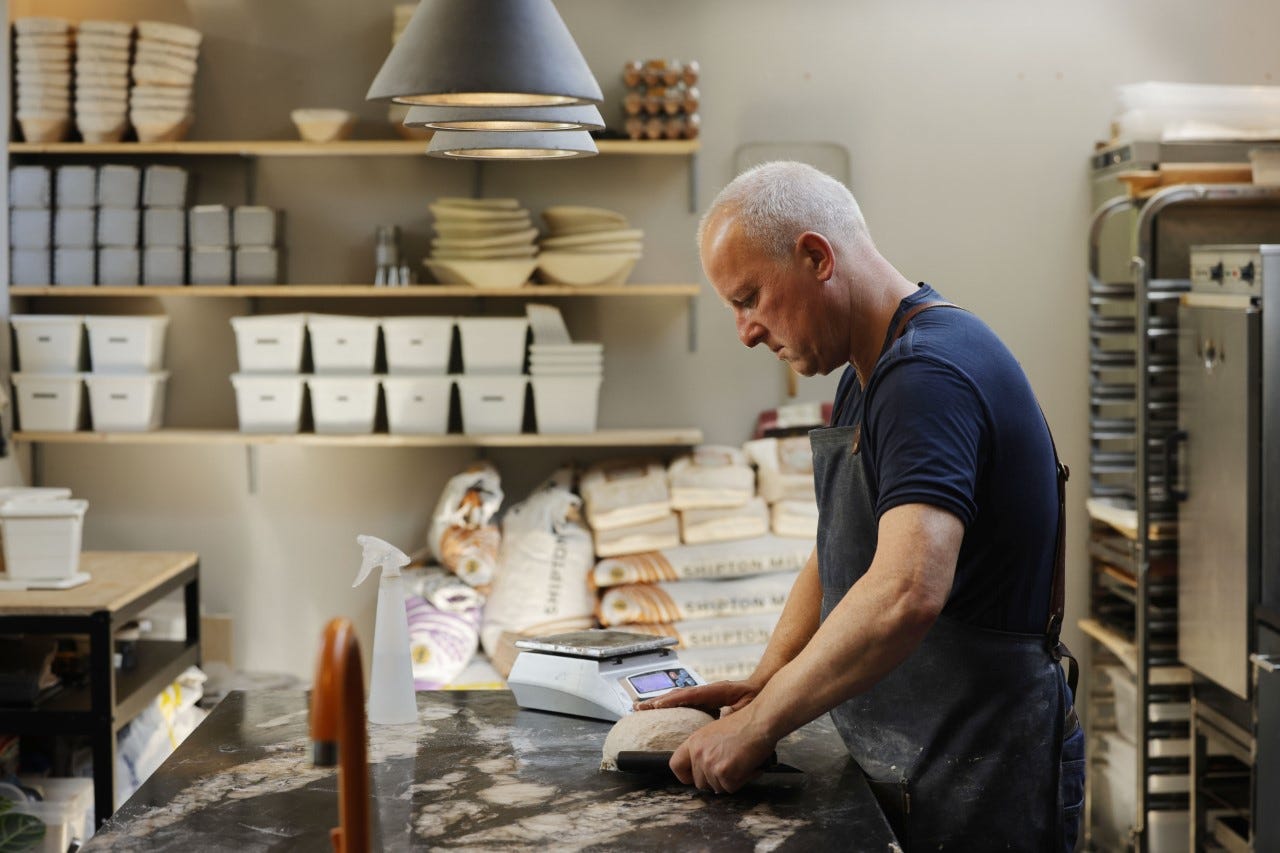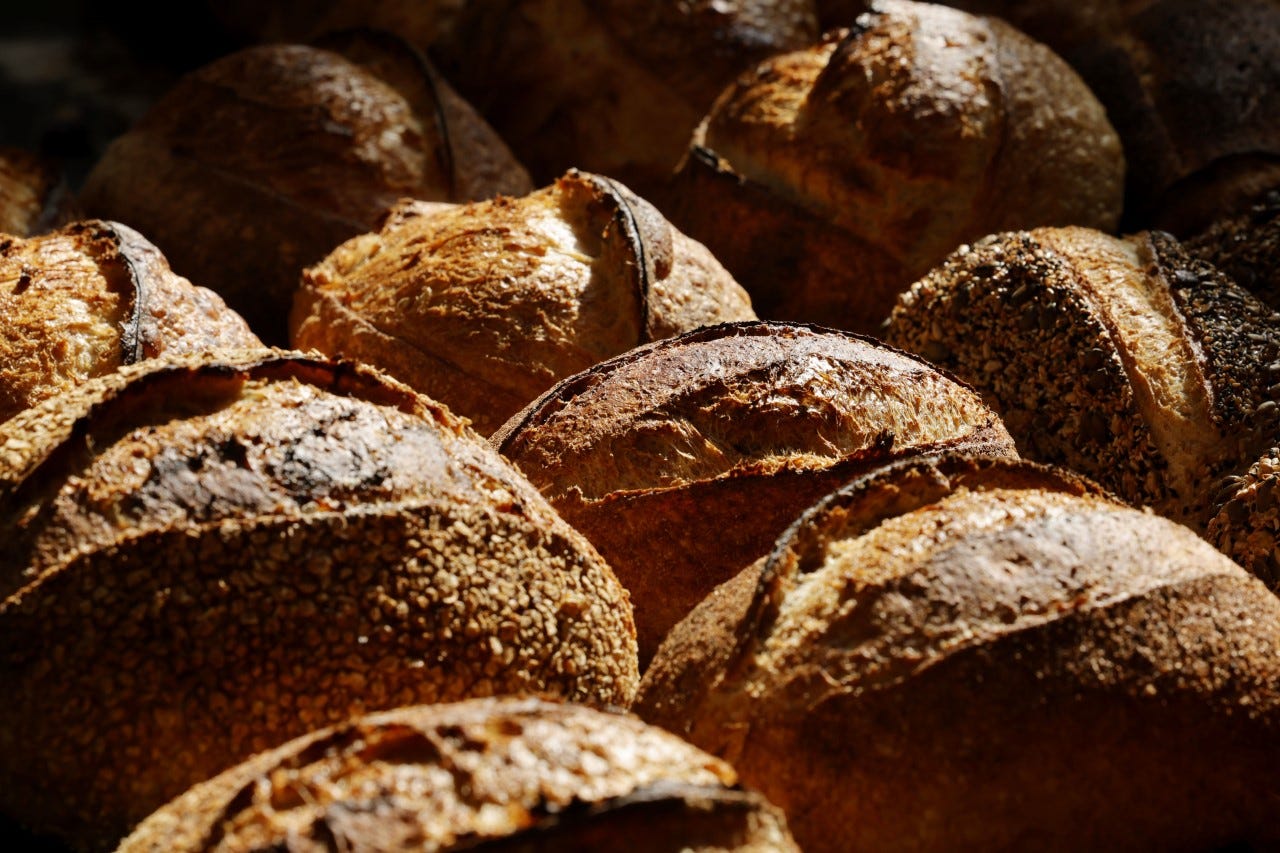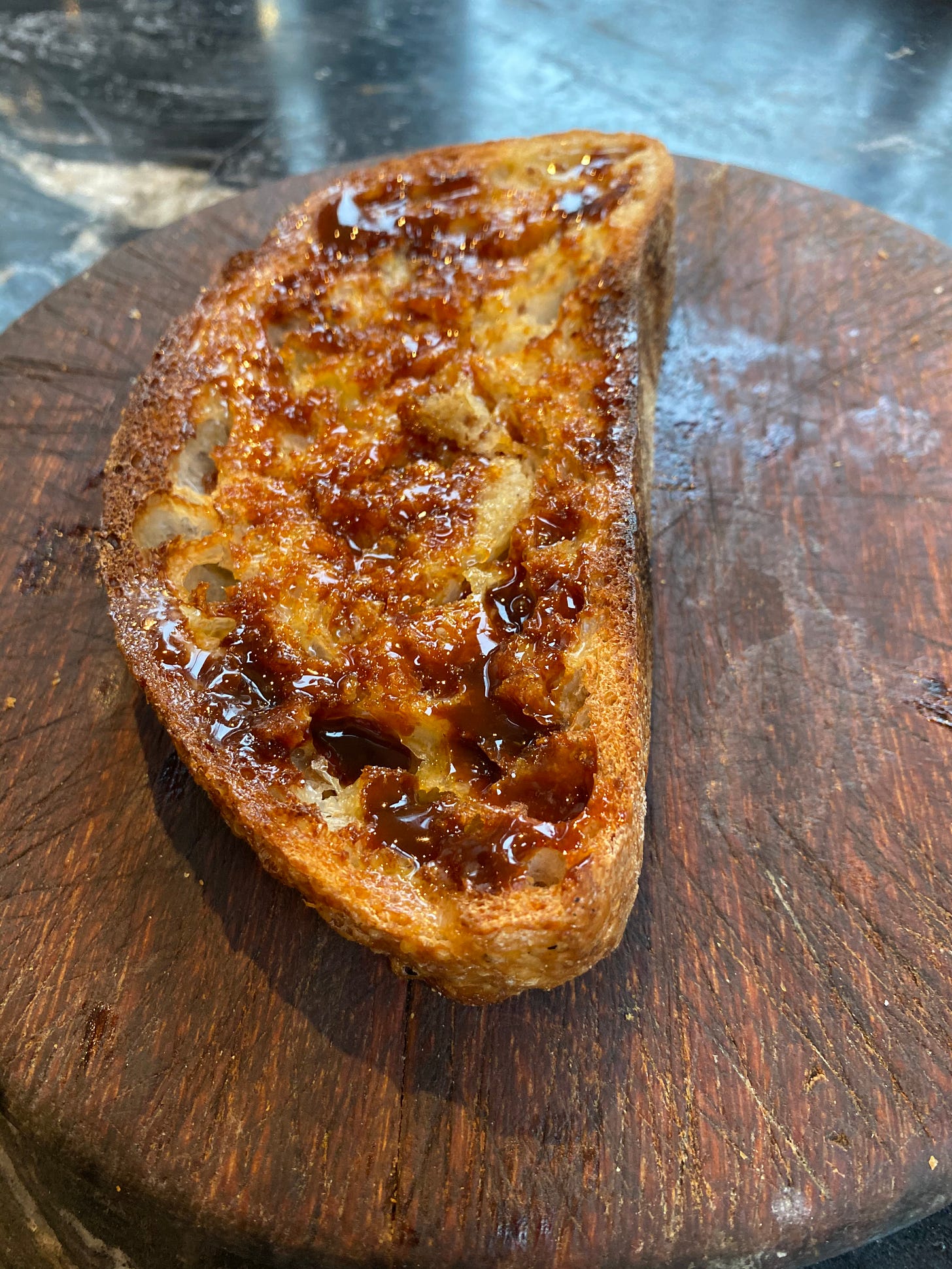Good Morning All,
This newsletter brings you on that journey about the food you were looking for, or perhaps never knew existed. It is our quest to expand on what we don’t know and to share with those who care. The Ómós Digest is a reader-supported publication, of which all contributors are paid. Please consider supporting this continued writing, research, and expanding our amazing team by upgrading to a paid subscription for €5 a month. We will love you forever.
This week’s article is written by Gerry Godley. In January, Gerry set up a micro bakery in Dolphin’s Barn called Bread Man Walking. When it comes to being a baker, he has taken the long way round. In his twenties he was a chef in decent kitchens in Dublin and London. In his thirties he was a musician, playing saxophones in jazz and Latin bands. He states, “I was no Charlie Parker but enjoyed modest success and had a great time”. That led to the business side of music. Over the next two decades he produced concerts, curated festivals in Ireland and presented jazz and world music radio programmes for RTE, while being an active advocate for the arts when the banks crashed in ’08. Higher education came next, and he spent the last 6 years as principal of The Leeds Conservatoire, one of the UK’s elite performing arts schools, commuting weekly between Dublin and Leeds. Covid brought him back to Ireland permanently, and with it an opportunity to question the things that were important to him. Throughout the music years, food remained a true north, and immersing his hands in flour proved to be the answer - slowly and patiently acquiring the intuition and dexterity that is the hallmark of the baker’s craft, fashioning loaves good and true from flour, water and salt, to be enjoyed in homes in his local community. He's endlessly curious about the place of food in our world, and when not baking, he's studying for a Masters in Irish Food Culture in UCC with the eminent food historian Regina Sexton. He's still trying to get better at the saxophone.
I consider myself lucky to have acquired a number of mentors over the years. A whole host of successful, compassionate individuals with a mutual desire to pass on wisdom to the development and growth of others. It’s a pay-it-forward mentality I feel very grateful to be on the receiving end of. To better understand this motive, in his book Leaders Eat Last, author Simon Sinek puts it down to biological chemicals. Dopamine gives us very addictive instant gratification, often by way of self-achievement. A hit, a compliment, a like. Often it strokes the ego. And we love it. However, it’s the selfless chemical oxytocin that provides us with a similar feeling of pride and satisfaction, but induced through random acts of kindness and generosity. While there’s no defined criteria for my mentors, there seems to be a pattern in personality. Bizarrely, and not by intention, for the most part they are male (while I would love to say that there was an equal mix of men and women, it's not the case, and I guess, these men act as father figures. I’ve both written and deleted this line 3 times, but now choose to leave it). Like my parents, who have been a great support throughout my entire life, each of my mentors possess a wealth of skills, having been around the block. But now, rather than safeguard their knowledge, their kind and modest nature enables them to seek to permeate their experiences, imparting what they know to those willing to learn. I am truly grateful and fortunate to have met people like Gerry Godley and wouldn’t be on the road I am without such unconditional guidance. When I first met Gerry, he invited me to his home in the heart of Dublin 8, a block off Fatima Mansions. Stepping into his red brick terraced dwelling, led down the corridor, to the most unlikely of locations, a domestic kitchen transformed into the most unique of micro bakeries I had ever laid my eyes on. But this I had been prepared for. I knew to expect unorthodoxy. I knew to expect great bread. What I didn’t know was that I was stepping into a friendship with one of the most inspiring people I have ever met. Feeling connected to people like this, developing powerful relationships, listening and also being given licence to be heard, provides us with powerful levels of oxytocin, and most significantly, a feeling of calmness and safety to allow us to carry out our best work. Let’s end on that note and pass the reins over to Gerry.
Milled in Ireland doesn’t mean grown in Ireland.

“With bread all sorrows are less”
– Sancho Panza speaking to Dapple the ass, from Don Quixote
I hesitate to call myself a baker. It seems a disservice to those that have pursued it for many years, and premature for a venture that has yet to mark its first year in operation. Let’s agree I’m a grey haired apprentice of the ancient craft of bread made with the hands, many years of discovery ahead of me. When I’m not making bread, I’m thinking about bread, the latter usually happening during the drudgery of cleaning necessitated by the former. Keeping a microbakery and its endless paraphernalia clean is a constant, and thus I find myself these days having a lot to say about bread.
You always have a lot to say, friends will interject, eyes rolling. They are right of course, but people will put up with a lot, especially when you feed them, and feeding my friends might well be my one redeeming quality. The ones that have served the longest sentences have grown wearily accustomed to the short fuse and general air of malignance in that critical, occasionally cantankerous hour before dinner comes to the pass, me barking out the staccato commands – “you, pick that mint”, “stop standing there”, “shell those broad beans”, “Tesco, ice, now” and such like. Unedifying behaviour, barely tolerable in the workplace, but the long arm of employment legislation does not yet reach into the domestic kitchen and twelve hungry guests on a Saturday night. But back to bread and constant fixation. Much to chew on. Bread is a vast subject old as civilization itself, and on which everything has already been written by more disciplined minds than mine. So much I don’t know where to start, not for the last hour anyway, procrastinating at the screen, all the usual displacement activities now exhausted, yesterday much the same.
So five minutes ago I got up and made a piece of toast. A thick slab hewn from my loaf’s fat waist, that central equator where it kept on rising until the wild yeasts, having exerted themselves lifting the dough mass, are sacrificed at the impressively named Thermal Death Point, around 60°C, beyond which heat kills all microbial activity. Having been subjected to trial by oven, my loaf again faces the flames of man, in trial by toaster. The time it takes to toast a slice is good only for daydreaming, so I loiter thereabouts until a tell tale wisp of acrid smoke reaches my nostrils, signalling that the appropriate level of char, which in my case is a bit too much char, has been acquired. I anoint the hot slice in butter, most of which quickly disappears into the alveoli, the holes generated by expanding gases that are characteristic of a well fermented sourdough loaf. So I do the sensible thing, and I apply a second coat, and follow that up with a viscous slick of Marmite, Marmite being my jam. Marmite lacks subtlety, I identify with that. There is nothing like the acoustics of disintegrating toast and the punch in the snot of salty Marmite to jolt your senses, and with that I’m back at the screen, stimulated by the presence of bread in my oral cavity to consider the place of bread in our lives.
You too have likely eaten bread today. We might both eat it again before the day is out, and we will not be alone. Everything we have done, from the moment long ago when our ancestors first made fire to your brain processing words in this moment, has required calories. Civilisations are built on language, tools, rituals, culture, laws, all requiring calories. For 10,000 years, it has been wheat, milled into flour, baked into bread, that has mostly provided them. Cities, canals, paved roads, libraries, monastic sites, temples, palaces, corn exchanges, garrisons, pyramids, tanks, extermination camps, oil rigs, data centres, constitutions, hierarchies, tyrannical regimes, poetry, all built on bread. More than any other food, it has enabled the greatest achievements and worst excesses of our species. Without it, our numbers would be vastly smaller and our demands on our fragile habitat more sustainable, something to reflect on as we lurch seemingly helpless toward our own species level thermal death point.
And yet there is nothing more banal, more soon forgotten than bread. The life force we most often consign to the bin uneaten, at least in that part of the world we like to call ‘developed’. But summon even the remotest prospect of taking away our pain quotidien, and our worst primal fears are realised. Panic in the aisles, and when they’re completely empty, revolution in the streets. We are all one shopping trolley away from bread shortage anarchy, and this is no coincidence. In historical terms, these contemporary times of abundant bread are an outlier, and a great dearth will again descend upon us if we continue to mismanage the ecology that puts it on our tables.





